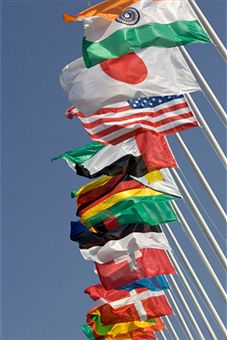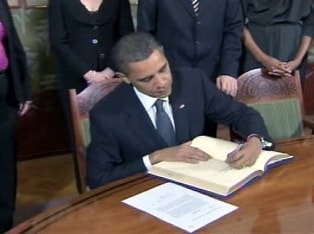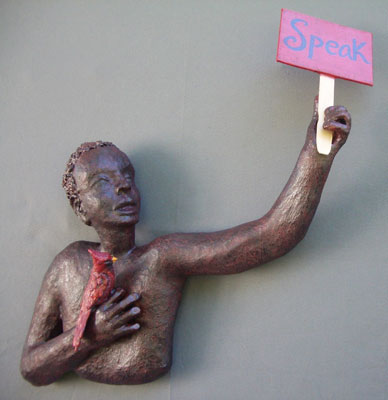بازی های المپیک

The Olympic Games
The modern Olympic Games began in the late-nineteenth century as a revival of the ancient Greek Olympics. Now just over one hundred years old, the modern Olympic movement is the biggest and most important sports movement in the world. In fact, many people believe the Olympic Games to be the most important cultural event of any kind in the world.
The modern Olympic Games were the brainchild of Frenchman Baron Pierre de Coubertin. De Coubertin’s dream for an international sports event and cultural movement became a reality in 1894 at the International Athletic Congress in Paris. After the Games were constituted in 1894, the first Olympic Games was held in Athens, Greece, in 1896, in recognition of the ancient Greek Olympic Games.
The original purpose of the Olympic Games in de Coubertin’s mind was to celebrate and strengthen the physical, mental, and cultural qualities of humanity. The Games would blend sport with culture, tradition, and education. The philosophy of Olympism is based on the joy of physical and mental effort and the respect for universal ethical principles. De Coubertin envisioned creating a more noble and sympathetic humanity through the Olympic movement.
The sports events themselves de Coubertin modeled after the English public school sport system. He saw in upper-class English boys’ sport the qualities of camaraderie, nobility, and honesty. Most importantly, however, was adherence to the rules of sport, in particular the rule that stated sport ought to be amateur in nature. De Coubertin believed participants should never participate in sport for the purpose of making money. To do so would contradict the underlying philosophy of sport. Breaking the amateur rule in de Coubertin’s time was as serious a violation as taking drugs to enhance performance is in today’s world of sport.
Over time, the Olympics grew to be the largest international festival of any kind. Today, debates exist as to the degree to which the modern Games adhere to de Coubertin’s original intent. On the one hand, Olympic sport is truly international in nature, as de Coubertin would have wanted it. On the other hand, it is doubtful that de Coubertin would have admired the existence of politics, commercialism, and drug use in sport. The Olympics have become truly international, but perhaps at a price.
There is little question that the Olympic Games hold out the possibility for fulfilling de Coubertin’s original goal of sport contributing to a better, more peaceful, and understanding world.
revival
a process in which something becomes active or strong again
The US and the UK have expectations of economic revival.
revival of
A revival of the timber industry is needed.
There has been a revival of interest in Picasso’s work.
—
brainchild

an idea, plan, organization etc that someone has thought of without any help from anyone else
brainchild of
The festival was the brainchild of Reeves.
this project was the brainchild of my father
This festival was the brainchild of the town’s mayor.
—
constitute

to formally establish or appoint:
Governments should be constituted by the will of the people.
—
in recognition of

public respect and thanks for someone’s work or achievements :
He has achieved recognition and respect as a scientist.
The importance of voluntary organizations in the economy still needs to be given recognition .
in recognition of something
He was presented with a gold watch in recognition of his service to the company.
—
blend

to combine different things in a way that produces an effective or pleasant result, or to become combined in this way
a story that blends fact and legend
blend with/together
Leave the sauce for at least one hour to allow the flavours to blend together.
—
ethical

relating to principles of what is right and wrong
ᅳsynonym moral
ethical issues/questions/problems
The use of animals in scientific tests raises difficult ethical questions.
The president must have the highest ethical standards .
—
envision

to imagine something that you think might happen in the future, especially something that you think will be good
ᅳsynonym envisage
As a young teacher, I envisioned a future of educational excellence.
he came to an end his school master had envisioned
—
noble

morally good or generous in a way that is admired
It’s very noble of you to spend all your weekends helping the old folk.
noble ideals
—
camaraderie

a feeling of friendship that a group of people have, especially when they work together
the camaraderie of the women’s basketball team
—
importantly
used to show that your next statement or question is more, equally etc important than what you said before
more/most/less/equally importantly
Most importantly, you must keep a record of everything you do.
—
adherence

when someone behaves according to a particular rule, belief, principle etc
adherence to
adherence to democratic principles
his adherence to religion
strict/rigid/slavish adherence
strict adherence to Judaic law
—
contradict

(of a statement, action, fact, etc.) to be opposite in nature or character to (another one); disagree with: Their alibis contradict each other. (=if one is true, the other must be false)
—
underlying

not directly expressed but quite important:
The underlying cause of his sudden departure
the underlying causes of her depression
There is an underlying assumption that younger workers are easier to train.
the underlying trend
—
over time

if something happens over time, it happens gradually during a long period
The research project will be assessed over time. Students are encouraged to consider the way language changes over time .
—
adhere

to follow closely or exactly
adhere to the rules
—
commercialism

the principle or practice of being more concerned with making money from buying and selling goods than you are about their quality – used to show disapproval
the commercialism of modern culture
—
at a price

for a lot of money
You can get goat’s cheese at the local delicatessen – at a price!
—
fulfill

to do or provide what is necessary or needed
fulfil a role/duty/function etc
A good police officer is not fulfilling his role if he neglects this vital aspect.
fulfil a requirement/condition/obligation etc
Britain was accused of failing to fulfil its obligations under the EU Treaty.
Much of the electrical equipment failed to fulfill safety requirements.
There is little doubt that the scheme fulfils a need for our community.